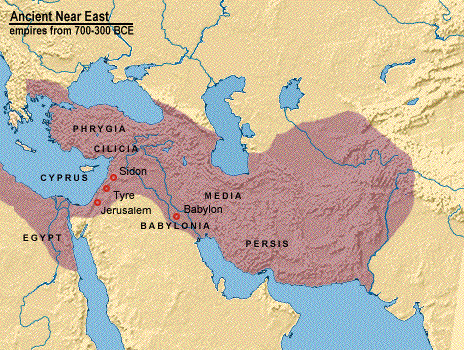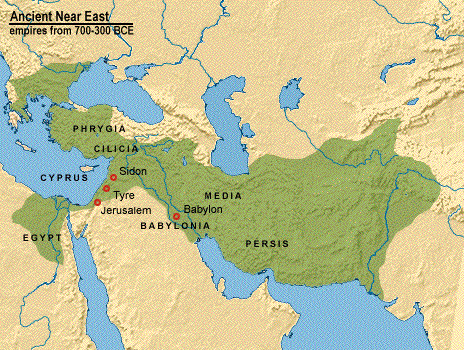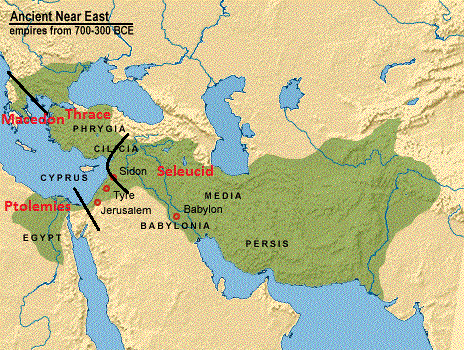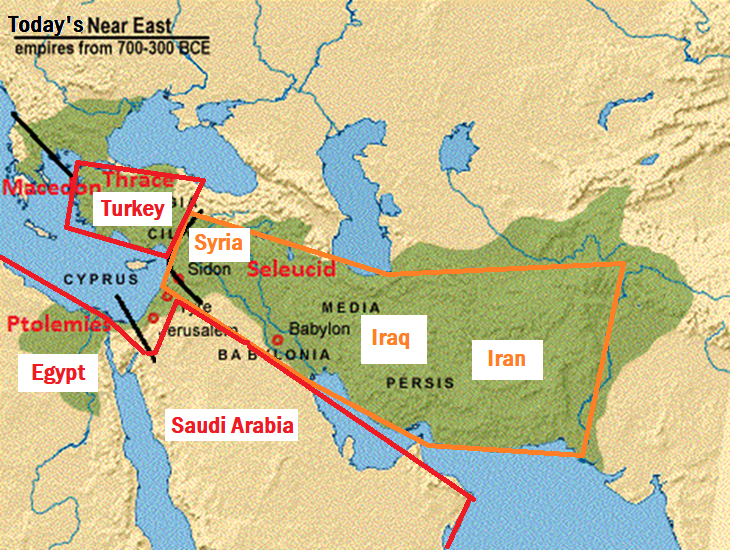Spiritual Warfare – Territorial spirits
Does the Bible speak about territorial spirits? If it does, does it speak about them in terms made popular by some Charismatic churches and ‘Christian’ novels like Frank Peretti’s “This Present Darkness”? Key verse to bear in mind Deut. 29:29 – “The secret things belong to the LORD our God, but the things that are revealed belong to us and to our children forever, that we may do all the words of this law.”
We need to understand what Paul means when he says that we “wrestle against the rulers, against the authorities, against the cosmic powers over this present darkness, against the spiritual forces of evil in the heavenly places”. Why is this important enough to find a place in Scripture? What else does Scripture say about such things?
Many who teach the importance of understanding territorial spirits encourage Christians to specifically pray against demonic forces in particular areas and to engage these evil forces in spiritual battle, addressing them as strongholds and applying 2 Cor. 10:4
See https://www.equip.org/articles/territorial-spirits-and-spiritual-warfare-a-biblical-perspective/ for an account of Christians trying to bind territorial spirits over San Francisco. The result of their efforts addressing the demons rather than the Lord? “… the school systems, politics, media, and especially the homosexual movement have gone much further” in the opposite way to what they were praying!
This emphasis is not seen in the New Testament. Rather than seeking out evil spirits to battle, the Christian life is about seeking maturity in Christ. We are called to be alert and take spiritual conflict seriously (1 Peter 5:8-9), but are to focus on walking according to God’s Spirit (Gal. 5:16) rather than on defeating evil spirits.
We must remember the words of 1 John 4:4: “Little children, you are from God and have overcome them, for he who is in you is greater than he who is in the world.” We have already overcome the spiritual forces of evil as followers of Christ. God’s power in us is greater than the power of evil in this world. When we trust in Christ, His power is sufficient for every spiritual battle we face, including any demonic forces we may encounter. Jesus defeated all the forces of the enemy at the Cross – the battle is already won! Col. 2:15; Heb.2:14; Matt. 28:18 (keys of death and of hades – next week?)
Scripture just states that these forces exist but does not give any details. So we are not to speculate as to what they are! However, they are in Scripture for a reason and seem to me to indicate the nature of the battle that we face.
We’ll look in a moment at some Scriptures that associate spiritual powers with territory. But for now let’s note that
- some fallen angels are said to be bound in the Euphrates Rev. 9:14; others chained in the darkness (the abyss? Ref. pigs and Legion) and reserved for judgement (2 Pet. 2:3) and in the blackness of darkness for ever (Jude 9).
- Paul uses ‘principalities and powers’ to describe spiritual forces in Eph. 6 but also for what I take to be human authorities in Titus 3:1 ref. Rom. 13:1 and 1 Pet. 2:14.
- There are specifically good spiritual principalities and powers too – the angels Daniel spoke to; Elisha’s servant was enabled to see the spiritual forces surrounding Elisha 2 Kings 6:17; in Heb. 1:14 angels God’s ‘ministering spirits’ sent to serve those who are heirs of salvation; Michael is called an archangel in Jude 9 (and he knows his place in the hierarchy!) and there is war in heaven when Michael and his angels fight against the dragon and his angels and prevail and throw them down to the earth; and there is the sound of an archangel at the Rapture associated with the Lord’s assembling shout and the trumpet of God! (1 Thess. 4:16).
Key passages:
- Deut. 32:8 When the Most High gave to the nations their inheritance, when he divided mankind, he fixed the borders of the peoples according to the number of the sons of God. (F. F. Bruce, who points out that the Septuagint reading “implies that the administration of various nations has been parcelled out among a corresponding number of angelic powers.” The question remains, however, as to whether these spirits are necessarily malevolent.)
- Isa 14:12-14 seems to indicate an evil spiritual power over Babylon who may be depicted in Rev. 17:1-8, 15, 18
- Ezek 28:12-16 seems to indicate an evil spiritual power called Prince/king of Tyre
- Dan 10:10-13, 20-21; 12:1 Persia, Greece and Israel (hinted at in Dan. 8:10-12, 20)
- John 12:31; 14:30, 16:11 Jesus says that “the prince/ruler of this world” is coming – presumably in the events surrounding the crucifixion (Satan entered Judas at the Last Supper)
- Eph. 2:2 he’s called the prince of the power of the air
- 2 Cor. 4:3 as “the god of this age”
- Who deceives the whole world and accuses us before God, but is eventually cast out into the earth Rev. 12:8-10
- Eph. 6:12 we wrestle against the rulers, against the authorities, against the cosmic powers over this present darkness, against the spiritual forces of evil in the heavenly places. See Eph. 1:21 (Col. 1:13 the power of darkness – the Colossians were in danger of worshipping angels – demons?)
Four categories in Eph. 6
Not explained, simply stated here. But elsewhere we learn:
- Rulers/principalities arche – idea of first or chief in order, time, place or rank (often translated ‘beginning’ as in John 1:1). They were created by Jesus Col. 1:16 (also “Authorities/powers” below) and He is head over them Col. 2:10 (also “Authorities/powers” below); He defeated them at the Cross Col. 2:15 and has been exalted above them Eph. 1:21 (also “Authorities/powers” below). He is demonstrating His wisdom to them through the church Eph. 3:10 (also “Authorities/powers” below) and maybe that is partly due to us being subject to earthly principalities Titus. 3:1 (also “Authorities/powers” below)
- Authorities/powers exousia privilege, delegated authority, jurisdiction or strength. Used by Jesus in casting out evil spirits and was delegated by Jesus to the Disciples at various times. Human governmental power is delegated by God to Human rulers, to whom we are to be subject Rom. 13:1-3. In resurrection all power was committed to Jesus Matt. 28:18, and He will eventually deliver it all up to God the Father 1 Cor. 15:24.
It is used of our privileges in Christ John 1:12, Rev. 21:14
Our enemy is currently the prince of the power of the air Eph. 2:2 and his dominion is call the power of darkness in Col 1:13, but our Lord Jesus has been exalted above them all 1 Pet. 3:22, where it is translated authorities, with another word dunamis translated as powers there - Cosmic powers/rulers kosmokrator a world ruler – only here in NT
- darkness skotos shadiness, obscurity therefore darkness – We have nothing in common with it 2 Cor. 6:14 although we once were characterised by it Eph. 5:8. We have been translated out its power Col. 1:13. We have been called out of it 1 Pet. 2:9
- all characterised by spiritual wickedness
Note the arena where they operate
- spiritual pneumatikos non-carnal – describes our blessings Eph. 1:3 and our praises and service Eph. 5:19; Col 3:16 1 Pet. 2:5. Here describes wickedness
- heavenlies epouranios above the sky, celestial – our Father Matt. 18:35; the Lord’s teachings John 3:12; the location of our blessings Eph. 1:3 and our calling Heb. 3:1, and our eventual eternal home Heb, 12:22; where Christ is seated Eph. 1:20 and therefore where we are seated Eph. 2:6; where the principalities and powers are located to whom Jesus is demonstrating His wisdom in the Church Eph. 3:10
What do we learn from these Scriptures?
From Got Questions:
Some of these passages imply that fallen angels have been given some type of responsibility over a certain area. Thus, they seem to be territorial. However, we need to remember that this teaching is inferred; the Bible never explicitly delineates a hierarchy of demonic authority in the world. What the Bible is clear about is that demons are at work in the world and that believers are very much involved in a battle against them.
The problem inherent in the term “territorial spirits” is that some Christians believe it is their duty to engage territorial demons in spiritual warfare. This, however, cannot be justified by Scripture. There is not a single instance in the Bible where someone actively sought out a demon in order to engage it. Demon-possessed individuals were encountered, and some were brought to Jesus and His disciples for healing, but the disciples didn’t go looking for demons to cast out of people. No one in the Bible ever prayed that the “demon princes” of a town be “bound” from working their will against the residents of that town.
Territorial spirits, although not explicitly a scriptural idea, may very well exist, as seen in these passages. Whether or not a spirit is “territorial” is really not that important, though. What is important is our response. A believer in Christ has no biblical support to engage in prayer-led spiritual warfare against demons. Rather, a believer needs to be aware that there is a spiritual battle and to take it seriously (1 Peter 5:8). Our lives need to be focused on prayer and on growing in faith. Should we ever encounter a demon, we definitely have the Christ-given authority to deal with it, but we should not go looking for them, territorial or otherwise.
From this we can learn:
- That satan currently has some authority over the ‘world’ [I take this to mean the social and political structures – see 1 John 5:19]
- That there is some sort of hierarchy of evil spiritual powers but we don’t have details and shouldn’t speculate!
- That they resist the work of God in redemption
- That there are spiritual powers with a particular interest in particular territories of the world
- That their opposition can be worked out in situations in those territories
- It seems that our struggle on Earth is mirrored in some way in the spiritual realm.
- And that prayer and fasting are the weapons to use if we are aware of that struggle
What is going on behind the political and social upheavals in our world?
I may be wrong, but it seems to me that conflicts in different ages involve the same territories over and over again, like there’s some wrestling match going on for control which is never settled.
Or course, wars are usually over resources – fertile agricultural land, water, control of access routes – which don’t change dramatically over time. Ukraine falls into this category. But this doesn’t necessarily explain all conflicts. Israel is a case in point, particularly Jerusalem!
Jerusalem has no natural resources, no water, doesn’t sit on any major trade route and isn’t strategically sited – it is surrounded by hills which are higher and is pretty indefensible from the north. Yet it is the most fought after city in the world. The ‘city of peace’ has apparently been besieged 49 times in history.
Why? Could it be anything to do with the fact that the God of Heaven has chosen it as His dwelling place? (Psa. 132:13-14) That it’s the place where all the great scenes in the story of Redemption have been played out? That it’s where Jesus is returning to? Unregenerate men are not aware of these things, but our enemy is! And he has always wanted what God has!
In Daniel ch. 11, he records a prophecy which charts the history of the next 200 years or so from his time. He was writing as the Babylonian empire had given way to the empire of the Medes and Persians, and predicts:
- the rise of the Greek empire, vv. 2-3
- it’s division into 4 areas, v4
- the dominance of two of those divisions, vv. 5-20 and
- the rise of a powerful tyrant, identified by scholars with Antiochus Epiphanes, who ruled around the time of the Maccabean rebellion. vv.21-35/40
A good study Bible or commentary (like David Pawson’s ‘Unlocking the Bible’) will identify the amazing accuracy of the predictions with the events of these centuries – so much so, that many scholars believe that they must have been written afterwards!
The description of the powerful tyrant goes beyond Antiochus after about v.36 and seems to merge into a description of the AntiChrist of the end times (see Dan. 7; Rev. 13).
What interests me is the political map which is implied by these prophecies.
This is the map of the Persian Empire in Daniel’s time:

encompassing North Africa, Egypt, Israel, Jordan, Lebanon, Syria, Iran, Iraq, and parts of Afghanistan and Pakistan
(The Saudi Arabian peninsular doesn’t seem to have been conquered, probably because it was sparsely inhabited and they hadn’t discovered oil (or the need for it!) at that time. Saudi Arabia, along with the other Gulf states, was created as the Allied Powers divided up the Middle East after the First and Second World wars.)
Then along came Alexander the Great, who conquered the Persians and extended his empire as shown here:

This is prophesied in Dan. 11:2-3
On his death (at the age of 33, supposedly of a broken heart because there were no more territories to conquer!), his empire was divided into 4 sections (as prophesied in Dan 11:4). The black lines below show roughly the divisions:

Macedon and Thrace faded into insignificance as the Seleucids and the Ptolemies battled for dominance. Israel was consistently overrun by them as they attacked each other – the Ptolemies from the south and the Seleucids from the north – hence the descriptions ‘King of the South’ and ‘King of the North’ in Dan. 11: 5ff. Their battles and intrigues are predicted in the rest of the chapter – upto about v. 35.
vv.36-40 mark the overlap between Antiochus’ times and the end-times. In vv. 40-42, he is pictured attacking the southern powers (Egypt, Libya and Ethiopia – approximately equivalent to the North African nations, see Ezek. 38-39 for a fuller description), invading Israel, with ‘Edom, Moab and the sons of Ammon’ (modern-day Jordan) being protected in some way.
If we refer back to the Persian empire map above, we can see the furthest territorial stretch of the lands covered by the prophecy. If we look at the map of the Macedonian empire after Alexander’s death, we can see the power structures that were prophesied.
Now, if we look at a map of the Middle East today, we can see the same power structures developing. The red and orange lines mark countries where Islam is the ruling ideology:
red = Sunni, orange = Shi’ite.

Iran (the heart of the Persian empire), Lebanon, and areas of Iraq and Afghanistan (countries east of the upper curved black line) are Shi’ite Muslim, and the countries below and to the left of the lower black line are Sunni Muslim. (Saudi Arabia is Wahabi Muslim – an extreme variation of Sunni. Turkey is also Sunni Muslim but it seems that Erdogan is looking to unite all Islam under his Caliphate).
In 2011, at the height of the so-called “Arab Spring”, I wrote:
Egypt is currently officially a secular state (as was Turkey – but that is becoming more ‘radicalised’). The elections later this year are likely to result in Egypt becoming an Islamic state – in fact, this is likely across all the North African states which have had ‘revolutions’ in the last couple of months. Egypt is also likely to break its peace treaty with Israel if this happens. By the end of the year, we could see an Islamic power base building up across North Africa actively hostile to Israel as Iran already is, (and the end of a very short-lived democratic movement – witness Gaza a few years ago, and the way Lebanon is going at the moment [Hezbollah being Shi-ite], or Iran after the West deposed the Shah in 1979).
Iraq was ruled by a Sunni government under Saddam Hussein, but will probably shift to Shi’ite after the USA/British troops leave as Shi-ites are in the majority. Jordan is relatively friendly to the West and has a peace treaty with Israel, so would likely remain neutral in any conflict between an Iran/Iraq coalition fighting a North African coalition – bearing in mind that the Shi-ites and the Sunnis regard each other as apostates and both want to impose their version of Islam on the rest of the world. The only thing which unites them is their opposition to Israel.
For the first time since the Romans obliterated the Macedonian empire, the political scenario would be very familiar to Daniel and seems to be moving towards the conflict described at the end of Ch.11 and beginning of Ch.12. Ezekiel 36-39 are also relevant to this, but that’s another study!
Update Nov. 2022: As we now know:
- Iraq did become Shi-ite dominated. The US had established a Government of National Unity with a Shi’ite President and a Sunni Prime Minister. A few days before the US evacuated from Iraq in 2013, the Sunni Prime Minister fled the country to Kurdistan – he read and took notice of the ‘writing on the wall’ unlike Belshazzar centuries earlier!
- Turkey has become more ‘radicalised’ (‘newspeak’ for Islamic fundamentalist)
- Egypt did elect an Islamic President (Morsi) and moved towards Sharia law, but this was short-lived as the pro-democracy protests grew stronger and stronger until the army intervened and the current President Sisi ousted the President Morsi in 2013.
- The states across North Africa largely have reverted to Muslim dictatorships
- Libya is split into rival factions fighting as to which tribal groups are to control the country.
Evidently, this was not the time for the southern power base to unite, but the building blocks are all there! To the north and east of Israel, Shi’ite Iran has consolidated its hold across the whole of the former Seleucid territory from Iran in the east, through Iraq and Syria to Lebanon (under Hezbollah) – the entire ‘fertile crescent’, known in Daniel as the territory of the King of the North, because they invaded Israel from the north, i.e. from Syrian territory; where the Iranian “Islamic Revolutionary Guard” is currently embedded with the forces of Syria on the border with Israel in the Golan heights, alongside the Russian forces – and Russia has recently said that Israel should vacate the Golan and hand it back to Syria! Join the dots!!
News 5/12/2022:
The latest resolution of the United Nations about Israel is against the 1948 rebirth of Israel as a nation after almost 2,000 years of Jewish exile. The UN is now calling it a catastrophe! In the UN, 90 nations voted in favour of the resolution, 30 nations were against it and 47 abstained which means in effect their silence spoke volumes as to their unwillingness to support Israel’s sovereignty as a nation if the real truth be known. This resolution against the 1948 establishment of Israel by the UN was spearheaded by Egypt, Jordan, the UAE, (countries which have political accords with Israel, 2 of which feature in the scenario painted by Daniel’s prophecy mentioned above) plus Senegal, Tunisia, and Yemen and of course fully supported by the Palestinian Arabs. In addition, also note that the United Arab Emirates signed the Abraham Accords with Israel but it would seem they are now singing a different song in the UN. Yet more dots to join!
For further updates and discussion of this, see this article which I wrote just after the fall of the Assed regime in December 2024. Also note that, since then, some pro-Iran factions have emerged in Syria supported by Iran’s Islamic Revolutionary Guards (IRGC).